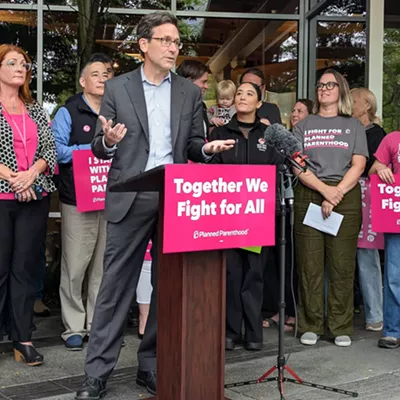Let's briefly review the film: General Jack D. Ripper (played by Sterling Hayden ) orders his B-52 SAC bomb wing, stationed at Burpleson Air Force Base, to implement "Plan R" and attack the Soviet Union. And why? General Ripper is impotent and he blames his "loss of essence" on fluoride in the water that can be blamed on "your basic commie conspiracy."
Enter George C. Scott as General Buck Turgidson. "Old Bucky" urges President Muffley (played by Peter Sellers) to follow up Ripper's raid with an all out nuclear attack, which, Turgidson promises, will destroy 90 percent of the Soviet Union's retaliatory force thereby assuring that the Russians' counterattack on America will result in acceptable casualties -- "10, 20 million tops, depending on the breaks."
Major T. J. "King" Kong, the B-52 captain who single-handedly starts World War III (played by Slim Pickens) pilots the only B-52 to make it through the Soviet air defenses. Kong's plane, however, has come under missile attack and the damaged bomb bay won't release the "nuclear device." Kong, now in war attire -- his cowboy hat -- heads down into the bomb bay and he straddles the bomb while working to reconnect the circuits. The connection made, the bay suddenly opens, the bomb falls and the Major is last seen riding it down, whooping and waving his Stetson all the way.
& lt;span class= & quot;dropcap & quot; & D & lt;/span & id Kubrick have some kind of crystal ball? These characters look very familiar as 2007 dawns. Ripper can be compared to the delusional Dick Cheney, who has been wrestling with his metaphorically precious bodily fluid demons ever since the run-up to the war. How else can we explain his cherry picking of WMD evidence and his caravan trips out to Langely where he inappropriately intervened to see to it that the CIA analysts didn't miss the all too obvious conspiracies, which were everywhere to be seen if you'd just take a sip of the Kool-Aid.
And General Turgidson? Aside from the obvious difference in persona. the comparison with Donald Rumsfeld leaps out. Scott's crude general was Kubrick's real life target, General Curtis "bomb 'em back to the Stone Age" LeMay; but, the dapper Rumsfeld gave us his own version of Stone Age bombing. His "shock and awe" comes to mind. Let's hit 'em from on high, with sanitized high-tech weaponry, and the rest will take care of itself. And about the insurgency and mounting civilian casualties; well, hey, "democracy is messy."
Dr. Strangelove himself (also played by Peter Sellars), the former Nazi scientist, could be considered a composite, the circle of neo-conservatives who beguiled the White House and Pentagon.
It is here, however, that the comparison makes the telling detour because Bush is Kong, the cowboy, not Muffley, the president. Bush is nothing like Muffley. Not in temperament, nor in intellect, nor in role. Muffley is thoughtful. Bush isn't.
In the crisis situation Muffley uses any and all means to avoid the catastrophe that Ripper has set in motion, including talking to the enemy. Muffley brings into the War Room the Soviet ambassador, Alexie Sadesky, and convinces him to contact by phone Soviet Premier Dimitri Kissov. After reassuring Kissov that he is just "as upset as you are, Dimitri," Muffley, much to the chagrin of Turgidson, comes up with a plan to give the Soviet military the routes of all of Ripper's planes so that the B-52's can be shot down. Bush wouldn't do this. No matter the situation, he blusters and swaggers; no, Bush would never consult with the enemy. No enemy or even potential enemy ambassador will ever be allowed in our War Room. And Bush, unlike Muffley, has yet to understand the wisdom offered by that real warrior, Winston Churchill, who said, "It's better to jaw, jaw than war, war."
Bush is Kong, a lowly major who, despite his limitations, has somehow found himself holding the power to destroy the world. Kong, like Bush, is shallow. He fails entirely to understand implications of his actions, which often lead to painfully funny juxtapositions. For example, the movie opens with a narrative explanation about the critically important SAC mission; but, then, the film quickly cuts to a shot of Kong's crew members who are seen reading Playboy while Kong sleeps.
& lt;span class= & quot;dropcap & quot; & L & lt;/span & ike Bush, Kong misses the gravity of most every situation. Here's my favorite Bushlike Kong line: The major is reading off the contents of his crew's survival kits: "One .45 automatic, two boxes of amminition ... one Ruuussian bible ... two packages of prophylactics, three leepsticks, three pair of nylon stockings -- shooooot, fella could have a pretty good weekend in Vegas with all that stuff."
Dropping the bomb? A weekend at Vegas? What's the diff? Hey, mission accomplished!
In such a dangerous and complex world, America needed for its president a capable and deliberate man, who, if necessary, would and could face down any and all of his looney generals (or, as was the case in the Iraq tragedy, any and all of his looney neo-con henchmen). But we didn't elect such a president. Instead we gave the world our very own cowboy major and made him "the decider."














